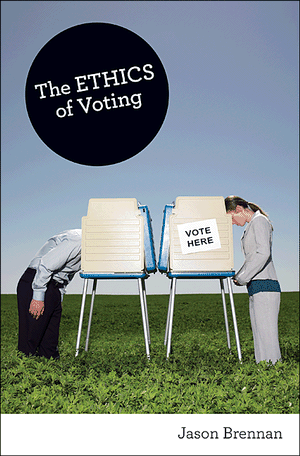 The picture to the left was the cover of Ruskin on Himself and Things in General, a late 1800s collection of essay extracts by John Ruskin. The white, bearded, thin-faced Ruskin tramples his dark, broad-faced and flat-nosed enemy. In the slain man’s hand is a bag that reads “Wealth of Nations” and “L.S.D.” (not the drug, but the abbreviation for “pounds, shillings, and pence”). Next to him is a book titled “The Dismal Science.” How does the “dismal science” connect with this obvious racism? Most know that economics got its unfortunate nickname from Thomas Carlyle, who coined the phrase based on Malthus’ population doomsdaying. However, this well-known story is simply not true. As economists David Levy and Sandra Peart explain,
The picture to the left was the cover of Ruskin on Himself and Things in General, a late 1800s collection of essay extracts by John Ruskin. The white, bearded, thin-faced Ruskin tramples his dark, broad-faced and flat-nosed enemy. In the slain man’s hand is a bag that reads “Wealth of Nations” and “L.S.D.” (not the drug, but the abbreviation for “pounds, shillings, and pence”). Next to him is a book titled “The Dismal Science.” How does the “dismal science” connect with this obvious racism? Most know that economics got its unfortunate nickname from Thomas Carlyle, who coined the phrase based on Malthus’ population doomsdaying. However, this well-known story is simply not true. As economists David Levy and Sandra Peart explain,
[Thomas] Carlyle’s target was not Malthus, but economists such as John Stuart Mill, who argued that it was institutions, not race, that explained why some nations were rich and others poor. Carlyle attacked Mill, not for supporting Malthus’s predictions about the dire consequences of population growth, but for supporting the emancipation of slaves. It was this fact—that economics assumed that people were basically all the same, and thus all entitled to liberty—that led Carlyle to label economics “the dismal science.”
Carlyle was not alone in denouncing economics for making its radical claims about the equality of all men. Others who joined him included Charles Dickens and John Ruskin. The connection was so well known throughout the 19th century, that even cartoonists could refer to it, knowing that their audience would get the reference.[ref]Levy and Peart’s series on “The Secret History of the Dismal Science” can be found at the Library of Economics and Liberty:
David M. Levy, Sandra J. Peart, “The Secret History of the Dismal Science, Part 1: Economics, Religion and Race in the 19th Century” (Jan. 22, 2001): http://www.econlib.org/library/Columns/LevyPeartdismal.html
Levy, Peart, “The Secret History of the Dismal Science, Part 2: Brotherhood, Trade and the Negro Question” (March 26, 2001): http://www.econlib.org/library/Columns/LevyPeartdismal2.html
Levy, Peart, “The Secret History of the Dismal Science, Part 3: The Governor Eyre Controversy” (June 4, 2001): http://www.econlib.org/library/Columns/LevyPeartdismal3.html
Levy, Peart, “The Secret History of the Dismal Science, Part 4: Paternalism, Hierarchy and Markets” (Aug. 27, 2001): http://www.econlib.org/library/Columns/LevyPeartdismal4.html
Levy, Peart, “The Secret History of the Dismal Science, Part 5: Parasite Economics and Market Exchange” (Dec. 17, 2001): http://www.econlib.org/library/Columns/LevyPeartdismal5.html
Levy, Peart, “The Secret History of the Dismal Science, Part 6: Eugenics and the Amoralization of Economics” (May 13, 2002): http://www.econlib.org/library/Columns/LevyPeartdismal6.html[/ref]
Perhaps capitalism has more to do with emancipation than exploitation.

 The picture to the left was the cover of Ruskin on Himself and Things in General, a late 1800s collection of essay extracts by John Ruskin. The white, bearded, thin-faced Ruskin tramples his dark, broad-faced and flat-nosed enemy. In the slain man’s hand is a bag that reads “Wealth of Nations” and “L.S.D.” (not the drug, but the abbreviation for “pounds, shillings, and pence”). Next to him is a book titled “The Dismal Science.” How does the “dismal science” connect with this obvious racism? Most know that economics got its unfortunate nickname from Thomas Carlyle, who coined the phrase based on Malthus’ population doomsdaying. However, this well-known story is simply not true. As
The picture to the left was the cover of Ruskin on Himself and Things in General, a late 1800s collection of essay extracts by John Ruskin. The white, bearded, thin-faced Ruskin tramples his dark, broad-faced and flat-nosed enemy. In the slain man’s hand is a bag that reads “Wealth of Nations” and “L.S.D.” (not the drug, but the abbreviation for “pounds, shillings, and pence”). Next to him is a book titled “The Dismal Science.” How does the “dismal science” connect with this obvious racism? Most know that economics got its unfortunate nickname from Thomas Carlyle, who coined the phrase based on Malthus’ population doomsdaying. However, this well-known story is simply not true. As 





